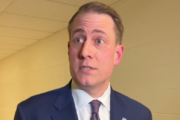Andy Smith, a certified financial planner and host of the radio show Investing Sense, recalls the most original way he’s heard of to pay off debt. “A son chose not to report his father’s death and collected his Social Security benefits for a year,” Smith says.
While that method of gaining extra money is bound to end with a trip to jail, there are other uncommon, yet perfectly legal, ways people find to wipe out their debt. Here are six options — along with their pros and cons — for those who have already cut their budget to the bone or simply can’t work a night or evening job into their schedule.
[Read: Trying to Dig Out of Debt? Don’t Make These Mistakes.]
Shopping, followed by selling. Shopping would seem to be the reason many people find themselves in debt, but it is also how some are digging themselves out. The internet is awash with tales of people buying clearance items or garage sale treasures locally and then selling them for a profit online. Meanwhile, websites such as TheSellingFamily.com and FBAFreedom.com promise to explain how to make a full-time income using the Fulfillment by Amazon service.
The drawback to this money-making method is the upfront investment needed to purchase items in the hopes they will sell. That could be a risky proposition. It can be difficult to stand out on eBay. Someone who is unable to sell his items for a profit may find he ends up compounding their debt problem, rather than solving it.
Redeeming credit card rewards wisely. Credit cards are another way people get into trouble with debt, but an unconventional approach to paying it off may involve charging more. Using a rewards credit card to charge necessities such as food and gas can result in points that may, depending on the program, be redeemed as a statement credit. That may not eliminate a person’s debt completely, but it can chip away at an existing balance.
However, this option only reduces debt if a person pays off all new charges each month. Otherwise, the charges simply add to the balance and dig a deeper financial hole. Kelsa Dickey, owner of Fiscal Fitness Phoenix, adds many people will find a credit card only leads to larger and more impulsive purchases. “It gives you another justification to buy something,” she says.
Getting involved in the sharing economy. For those who can’t find the time for a traditional second job, working in the sharing economy may be a more feasible option. Driving for Uber, pet sitting through Dog Vacay and doing odd jobs through Task Rabbit are all options to pick up extra money without a significant time commitment. Dickey has one client who earned extra money to clear out debt by renting a room through Airbnb to flight attendants who were stopping over in the area.
Most sharing economy jobs — or gigs, as they are commonly called — require little upfront investment. It may be as simple as signing up on a website and creating a profile page. The downside to these easy entry jobs is there can be significant competition, and once all the time is factored in, the hourly wage may be less than what could be earned through a more traditional second job.
[Read: How to Balance Debt Reduction and Retirement Savings.]
Asking for money from family. Financial advisors say asking for loans from family members has the potential to ruin future holiday get-togethers, but those in dire straits may find financial relief by asking for an advance on expected cash. “It can be a bit uncomfortable, but they could ask for an advance on Christmas gifts,” says Joseph Heider, founder of Cirrus Wealth Management in Cleveland, Ohio. “I’ve seen people advance inheritances to pay off debt.”
If relatives balk at the suggestion, it could make for strained family dynamics. However, even if they do grant the request, this method to becoming debt-free could have a downside. Without having to make any sacrifices to pay off debt, people may find they quickly rack up new bills because they haven’t broken their bad spending habits.
Renegotiating the balance. Although not an option for everyone, those who are behind on their bills may be able to negotiate their balance down to a lower amount. “I always say to shoot for 40 percent [of the balance],” Dickey says. Credit card companies and debt collectors may be willing to accept a lower lump sum payment to close out an overdue account.
The catch is an account typically must be delinquent before a creditor is willing to negotiate, and allowing bills to go unpaid can seriously impair a person’s credit score. What’s more, if a portion of the debt is forgiven, that amount may end up being taxable under federal law.
Borrowing money from a 401(k). While the debt doesn’t disappear with a 401(k) loan, the interest ends up being paid into the retirement account rather than a credit card company’s pockets. However, financial advisors strongly caution that a 401(k) loan should be used only as a last resort. “You’re facing bankruptcy. You’re facing medical liens,” Smith says. “These are the times when you need to think about taking out a 401(k) loan.”
A 401(k) loan could have negative effects on a person’s ability to retire comfortably. If too much money is pulled from the account for too long, workers may miss out on some of the benefits of compound interest. Plus, if they leave their job before the loan is paid off, the entire balance becomes due immediately. Failing to pay can result in the loan amount being subject to income taxes and also a 10 percent early withdrawal penalty for workers younger than age 59 ½.
[See: 10 Ways to Avoid the IRA Early Withdrawal Penalty.]
The problem with borrowing money from a 401(k) or any other quick fix to eliminating debt is that these solutions rarely change a person’s spending habits. “The temptation is to celebrate being debt-free by going on vacation or buying a new car,” Heider says. Instead of looking for a way to painlessly eliminate debt, he suggests, “The critical part [of long-term success] is to build a budget to incorporate the retirement of debt.”
More from U.S. News
How to Develop a Foolproof Plan to Pay Off Debt
The Best Method for Paying Off Each Kind of Loan
6 Unusual Ways to Get Out of Debt originally appeared on usnews.com







